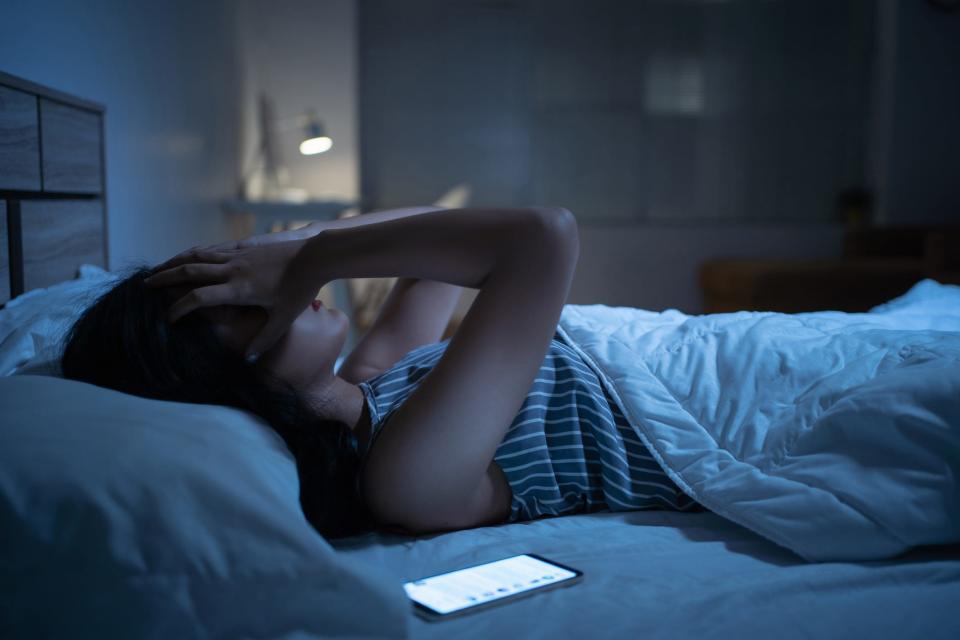What is sleep hygiene? Tips and changes you can make to get better quality sleep.
Adults between the ages of 18 and 60 should get seven or more hours of sleep per night, but about 35% of adults in a 2020 survey reported sleeping less than that. The number is higher for high schoolers on both ends – teens should get eight to 10 hours of sleep, but almost 80% said they received less, the Centers for Disease Control and Prevention reports.
Sleep is important no matter your age. If you’re looking to improve your nighttime habits and feel well-rested, here’s everything you need to know about managing sleep hygiene:

What is sleep hygiene?
Sleep hygiene is a set of recommendations to form healthy habits for sleep. When you say you have good sleep hygiene, you’re following those guidelines and avoiding behavior that prevents a good night’s rest.
Is melatonin safe?: What to know about the sleep-inducing supplement
Why is sleep hygiene important?
Not only is it important to get seven to eight hours of sleep per night, but it's also critical to have good quality sleep, says Dr. Hal Alpert, a board-certified sleep medicine specialist.
Developing healthy sleeping habits is a critical step toward getting this quality snooze time.
“The most common reason for people to be tired and sleepy is that they’re not allowing themselves adequate sleep time,” Alpert says. “They’re not scheduling it.”
For night owls, especially students up late studying or socializing, it may seem logical to just sleep in on the weekend. But playing catch up with sleep is disrupting the healthy habits needed for good sleep hygiene, Alpert says.
“It takes almost two weeks to really make up for a sleep deficit like that,” Alpert says.
How to improve your sleep hygiene
Improving sleep hygiene doesn’t just happen at bedtime – your pre-bedtime rituals and daily routine can affect your sleep greatly.
1. Stay consistent
Consistency is key: a regular bed and wake-up time can help set your biological clock to become sleepy at the same time every day.
Alongside this, Alpert recommends limiting any daytime naps to a total of 30 minutes. Lengthy naps can cause your body to not feel tired when it’s time for bed.
2. Wind down
A period of “wind-down time” is another step to ensure you’re getting a good quality night of sleep. Alpert recommends trying a relaxing meditation, a warm bath or shower, reading, or listening to calming music.
If you’ve tried counting sheep and you can’t fall asleep for more than 30 minutes, Alpert advises getting out of your bedroom entirely and repeating the wind-down process.
3. Establish your sleeping space
This wind-down process should happen outside of the bedroom.
“Use the bedroom only for sleep and sex,” Alpert says. “If you’re doing a lot of activities in the bedroom and not sleeping, your brain doesn’t associate the bedroom with being asleep.”
The bedroom should be a cool, dark, quiet and comfortable place to ensure the best possible sleep experience. Dark shades and earplugs can achieve this.
If you find yourself tossing and turning with thoughts, Alpert recommends making tomorrow’s to-do list tonight.
“Keeping a pen and a pad at the bedside to jot down the last-minute tasks that pop into your head will prevent you from … having to remember and think about it all night long,” Alpert says.
4. Avoid alcohol, food, caffeine and electronics before bed
If you’re living with poor sleep hygiene, there’s a chance your pre-bedtime activities are causing it.
Avoid alcohol, food and caffeine before bed, Alpert says. Eating before bed has been known to cause acid reflux, and caffeinated beverages (including soda, coffee, tea and chocolate) may keep you up at night. And while you may be tempted to end the night with a glass of wine, alcohol can impact your sleep.
“Although it’s a sedative, it wears off and then you have a rebound effect when you wake up during the night,” Alpert says.
You should also avoid using electronics before bed and even leave them outside of the bedroom. According to Alpert, the blue light from your iPhone or tablet prevents the release of melatonin from the brain, which is the body’s signal to sleep.
5. Exercise regularly
You can improve your sleep regimen by exercising regularly during the week. Several studies have linked increased aerobic exercise and better quality sleep for individuals with insomnia.
When it comes to insomnia, tips and tricks for the average sleeper may not be effective. If nothing seems to be working and you're snoring or experiencing other symptoms of sleep apnea, Alpert recommends seeing a physician as there may be other underlying conditions at play.
Improving sleep hygiene for children
Children have different daily routines and sleep needs than adults – school-age children should get between nine and 12 hours of sleep every day, the CDC says, and children 3-5 years old should get between 10-13 hours of sleep.
Alpert recommends setting a routine for your children to develop healthy sleep habits as they age.
Fall back: Why daylight saving time can disrupt healthy sleep
Just Curious for more? We've got you covered
USA TODAY is exploring the questions you and others ask every day. From "How often can you buy Advil?" to "What is an empath?" to "How many hours a day do dogs sleep?", we're striving to find answers to the most common questions you ask every day. Head to our Just Curious section to see what else we can answer for you.
This article originally appeared on USA TODAY: What is sleep hygiene? Tips to help improve quantity, quality of sleep

